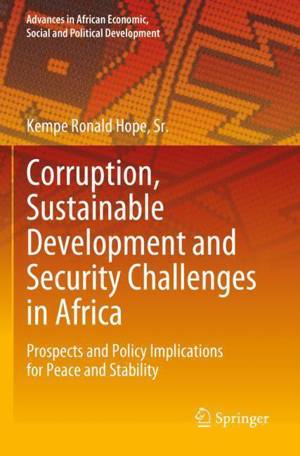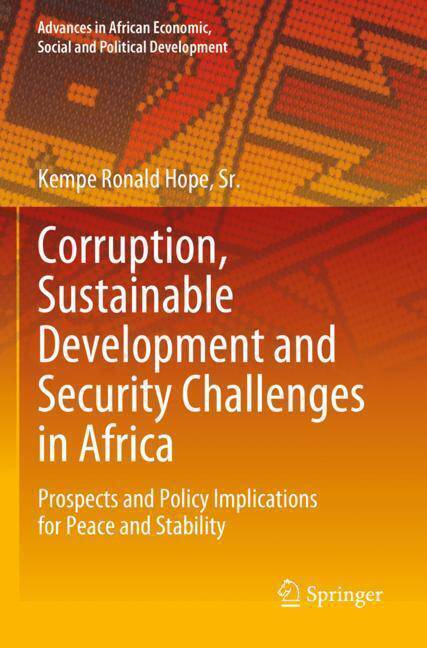
- Retrait gratuit dans votre magasin Club
- 7.000.000 titres dans notre catalogue
- Payer en toute sécurité
- Toujours un magasin près de chez vous
- Retrait gratuit dans votre magasin Club
- 7.000.0000 titres dans notre catalogue
- Payer en toute sécurité
- Toujours un magasin près de chez vous
Corruption, Sustainable Development and Security Challenges in Africa
Prospects and Policy Implications for Peace and Stability
Kempe Ronald Hope SrDescription
This book sheds light on Africa's development performance and dynamics arising from the interface between corruption and sustainable development on the one hand and the challenges that poses for peace, security and stability. Corruption also contributes to the spread of terrorism and violent extremism. Pervasive corruption networks often include politicians, civil servants working at all levels of state institutions, representatives of the private sector and members of crime syndicates. The consequences of corruption are detrimental in many aspects, such as undermining governments' ability to serve public interests and eroding public trust in democratic processes.
Presenting empirical evidence, the book explains why corruption and the looting of staggering amounts of national assets undermine the achievement of the Sustainable Development Goals (SDGs) and has a negative impact on peace, stability, security, the rule of law, gender equality, the environment and human rights. This makes the book a must-read for students, researchers and scholars of political science, international relations, and economics in general, as well as African studies, development studies, and security sector studies in particular, covering issues and themes on corruption, governance, socio-economic sustainable development, public administration and management, policing in an international context, police reform, and security sector reform. It will also serve as a helpful resource for policy-makers interested in a better understanding of the connection between corruption, sustainable development, and security challenges in Sub-Saharan Africa.
Spécifications
Parties prenantes
- Auteur(s) :
- Editeur:
Contenu
- Nombre de pages :
- 224
- Langue:
- Anglais
- Collection :
Caractéristiques
- EAN:
- 9783031322310
- Date de parution :
- 09-09-24
- Format:
- Livre broché
- Format numérique:
- Trade paperback (VS)
- Dimensions :
- 155 mm x 235 mm
- Poids :
- 382 g

Les avis
Nous publions uniquement les avis qui respectent les conditions requises. Consultez nos conditions pour les avis.






